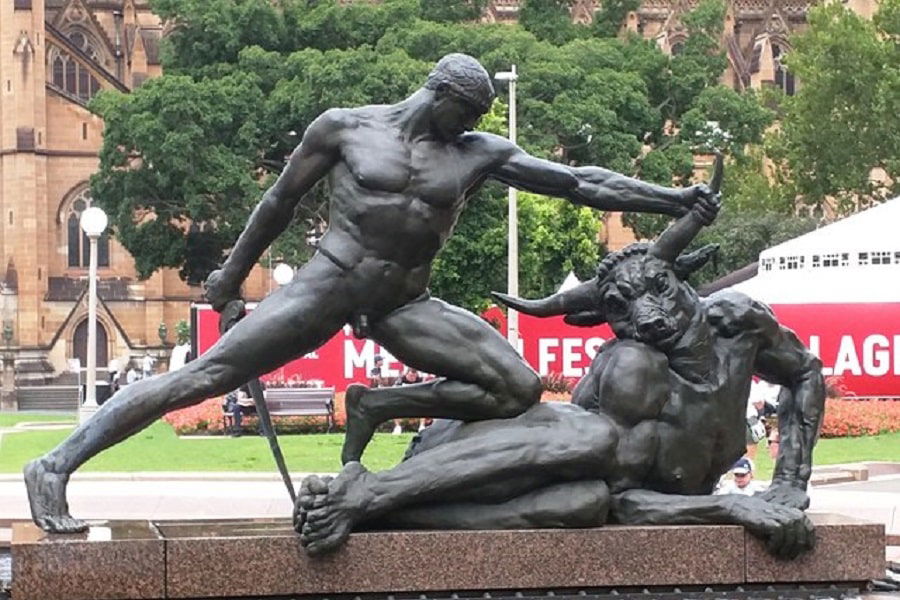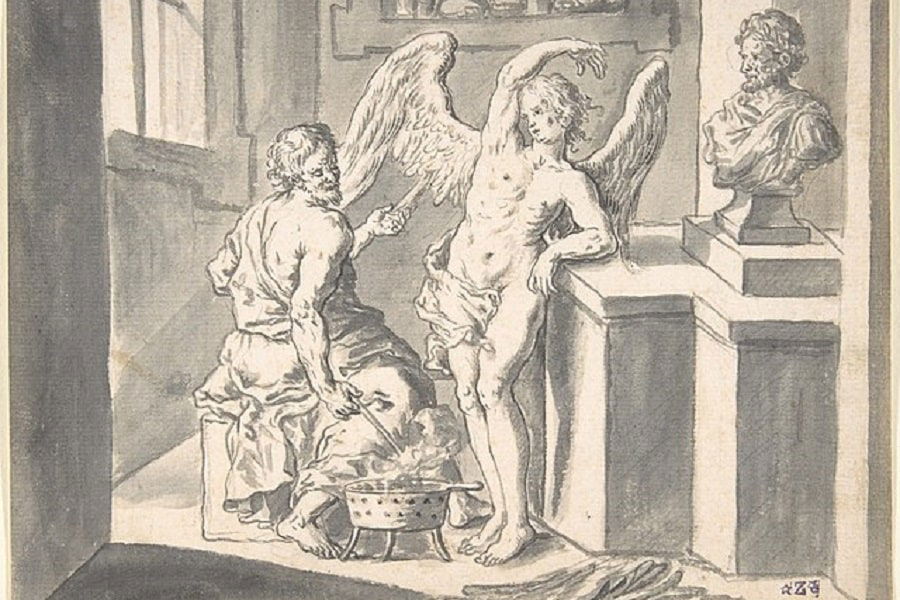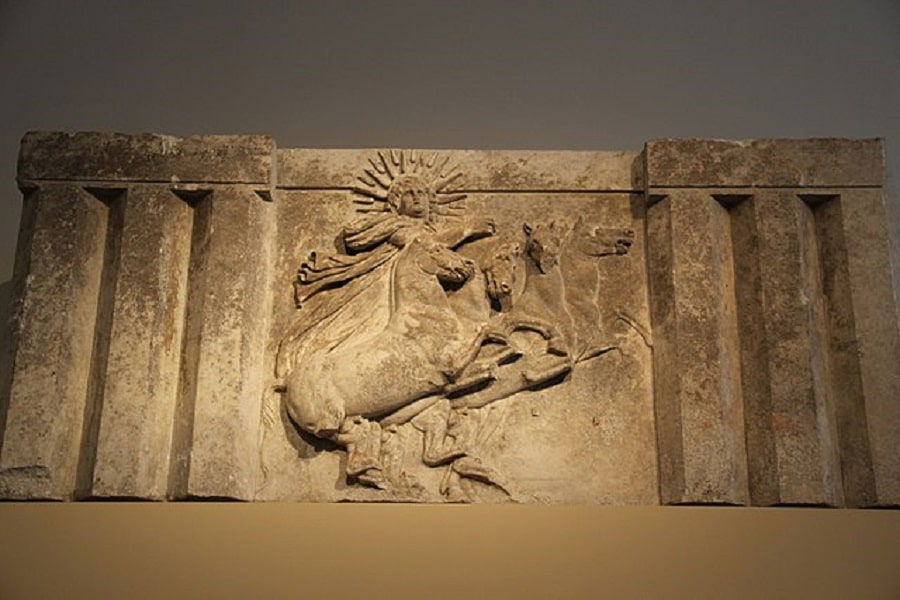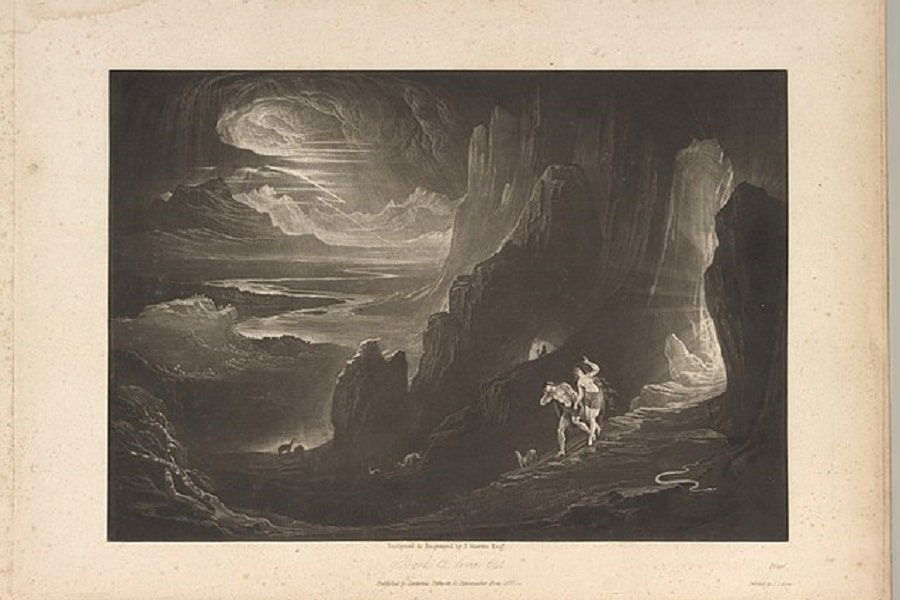The story of Icarus has been told for centuries. He is infamously known as the “boy who flew too high,” who crashed to earth after melting his waxen wings. Initially recorded in 60 BCE by Diodorus Siculus in his The Library of History, the most popular variation of the tale is written by the Roman poet Ovid in his Metamorphoses in 8 CE. This cautionary legend has proven its resilience against the passing of time, being reimagined and retold several times.
In Greek mythology, the myth of Icarus has become synonymous with excessive pride and foolhardiness. Indeed, Icarus and his daring attempt to escape Crete alongside his father was a harebrained scheme that, granted, would’ve worked. However, more famous than the flight of Icarus is his fall. His plummet into the sea became a cautionary tale for those whose ambitions burned all too close to the sun.
The popularity of Icarus outside of Greek mythology is found mainly in the tragedy of the tale. That, and the ability to be applied to various settings and characters has made Icarus a popular literary figure. Hubris may have cemented his death in Greek mythology, but it has made Icarus live on in modern literature.
Table of Contents
Who is Icarus in Greek Mythology?
Icarus is the son of the legendary Greek craftsman, Daedalus, and a Cretan woman named Naucrate. Their union came after Daedalus created the famed Labyrinth at the behest of King Minos of Crete at Knossos. Legends do little to flesh-out Naucrate, with Pseudo-Apollodorus simply citing her as a slave within the court of Minos.
By the time Daedalus’ welcome ran out at the court of Minos, Icarus was between 13 and 18 years old. The Minotaur had been recently killed by the Athenian hero-king, Theseus. A youth, Icarus was reportedly uninterested in his father’s trade. He was also incredibly bitter towards King Minos for treating Daedalus poorly.
In Greek myth, the Minotaur is a famous monster that had the body of a man and a bull’s head. It was the offspring of Queen Pasiphae of Crete and the bull of Poseidon (also known as the Cretan bull). The Minotaur was known to have roamed the Labyrinth – a maze-like structure created by Daedalus – up until its death.

Was Icarus Real?
There is no hard evidence that Icarus existed. Like his father, he is considered to be a mythical figure. Additionally, Icarus may be a popular character today, but he is a minor one in the whole of Greek mythology. Other more frequent mythical figures, like beloved heroes, overshadow him greatly.
Now, Daedalus and Icarus’ mythical origins didn’t stop the geographer Pausanias from attributing numerous wooden xoana effigies to Daedalus in the Description of Greece. The characters of Daedalus and Icarus were from the Greek Hero Age, sometime during the height of the Minoan civilization in the Aegean. They were once considered archaic figures from history, rather than beings of myth.
What is Icarus the God Of?
Icarus is not a god. He is the son of two mortals, regardless of Daedalus’ suspiciously impressive skillset. The nearest relation that Icarus has to any sort of god is Athena’s blessing of his father’s crafts. Other than a little bit of divine favor, Icarus has no relation to the gods and goddesses of Greek mythology.
Despite his lack of divinity, Icarus is the eponym for the island of Icaria (Ικαρία) and the nearby Icarian Sea. Icaria is in the middle of the northern Aegean Sea and is said to be the nearest landmass to where Icarus fell. The island is famous for its thermal baths, which the Roman poet Lucretius notes harm birds. He initially made this observation in his De Rerum Natura when discussing the ancient volcanic crater, Avernus.
Why is Icarus Important?
Icarus is important because of what he represents: excessive pride, daring ambition, and foolishness. Icarus is not a hero, and Icarian feats are points of shame. He does not seize the day, but the day seizes him. The importance of Icarus – and his doomed flight – can best be emphasized through an ancient Greek lens.
A major theme throughout many Greek myths is the consequence of hubris. Although not everyone venerated the gods in the same way, especially regionally, insulting the deities was a huge no-no. Ancient Greeks often viewed worship of the gods and goddesses as due diligence: it was expected of them. If not legally, then certainly socially.
There were civic cults, city gods, and sanctuaries throughout the ancient Greek world. Ancestral worship was commonplace as well. So, the fear of being arrogant before the gods was a real one. It’s not to mention that most gods were believed to influence natural phenomena (rain, crop yield, natural disasters); if you weren’t struck dead or had your lineage cursed, your hubris could have caused a famine.
The flight of Icarus is one of the more famous Greek myths that caution against arrogance and committing hubris. Other cautionary myths include the legends of Arachne, Sisyphus, and Aura.
The Icarus Myth
The myth of Icarus takes place soon after Theseus slew the Minotaur and fled Crete with Ariadne at his side. This enraged King Minos. His wrath fell on Daedalus and his son, Icarus. The young boy and his father were locked in the Labyrinth as punishment.
Though ironically trapped within Daedalus’ masterwork, the pair eventually escaped the maze-like structure. They could thank the queen, Pasiphae, for that. However, King Minos had complete control of the surrounding seas, and Pasiphae could not grant them safe passage out of Crete.

Greek mythology then goes on to describe how Daedalus constructed wings so that they could escape. He arranged bird feathers from shortest to longest before sewing them together. Then, he attached them at their base with wax and gave them a slight curve. Arguably the world’s first flying machine, the wings that Daedalus made would carry him and his son safely from Crete.
Daedalus knew the risk of flying and warned his son. Their escape would be a long journey that was filled with hazards. It isn’t every day that man flies across a sea. According to the Roman poet Ovid in Book VIII of his Metamorphoses, Daedalus warned: “…take the middle way…moisture weighs down your wings, if you fly too low…you go too high, the sun scorches them. Travel between the extremes…take the course I show you!”
Like many teens, Icarus paid no attention to his father’s warnings. He kept soaring higher until his wings began to melt. The fall of Icarus was fast and sudden. One minute the young man was flying above his father; the next, he was crashing down.
Icarus plummeted towards the sea as Daedalus hopelessly watched on. Then, he drowned. Daedalus was left to bury the body of his son on the nearest island, Icaria.
Why Did Icarus Fly to the Sun?
There are varying accounts as to why Icarus flew to the sun. Some say he was lured to it, others argue he reached for it out of his arrogance. In popular Greek myth, it is believed that Icarus’ folly was equating himself with the god of the sun, Helios.
What we can say is that Icarus did not intentionally disregard his father’s warnings as much as he put them aside. He did initially listen and heed Daedalus’ caution. However, flying was a bit of a power trip, and Icarus caved fast to the pressure.
Above all else, Icarus flying too close to the sun is best interpreted as a test of the gods. It does not matter if the act was intentional, fleeting, or accidental. As with all mythological characters that challenged the gods, Icarus became a tragic figure. Despite his great ambitions, all his dreams came crashing down (literally).
Some versions of the tale establish that the young man had dreams of grandeur before Daedalus and Icarus even attempted to escape Crete. He wanted to marry, become a hero, and leave his average life behind. When we consider this, perhaps Icarus was susceptible to disobeying Daedalus.
When Daedalus crafted two pairs of wings to escape Crete, he could not have bargained for his son to try and defy the gods. However, flying was a new freedom and made Icarus feel invincible, even if his wings were mere wax and feathers. Even if it was for a moment before the sun’s heat melted his wings, Icarus felt like he could actually be something great.

Alternatives to the Icarus Myth
The myth popularized by the Roman Ovid comes in at least two distinct variations. In one, which we went over above, Daedalus and Icarus tried to escape Minos’ clutches by the sky. It is the more fanciful of the two and the most romanticized by artists and poets alike. Meanwhile, the other myth is considered euhemerism.
Euhemerism is the theory that mythological events were far more historical and based on reality. For example, Snorri Sturluson had a preference for euhemerism, which explains the Yngling Saga and other aspects of Norse mythology. In the case of the tale of Icarus, there exists a variation in which Daedalus and Icarus flee by sea. They managed to escape the Labyrinth, and rather than taking flight, they took to the sea.
There are rationalizations from Classical Greece that argue “flight” was used metaphorically when describing the escape. That being said, this alternative story is far less popular than the original. Icarus dies by jumping off the boat a little funny and drowning.
Would you rather hear a story about that, or one of a boy who took flight, only to tragically fall? Also, we can’t sleep on the fact that Daedalus made functional wings – the first flying machine – and would later live to curse his invention. Not to be that person, but give us the drama, please.
Another variation of the tale is the inclusion of Heracles since that guy is involved in everything. It is said that Heracles is the one who buried Icarus, as the Greek hero was passing by when Icarus fell. As for Daedalus, as soon as he reached safety, he hung up his wings in the temple of Apollo at Cumae and vowed to never fly again.
What Killed Icarus?
Icarus died as a result of his hubris. Oh, and the heat of the sun. Especially the heat of the sun. If you ask Daedalus though, he would’ve pinned the blame on his accursed inventions.
Several things could have led to Icarus’ early death. Sure, flying on wings made of wax probably wasn’t the safest. It probably wasn’t the best escape plan to make with a rebellious teen in tow. Though, we’re not about to dock points from Daedalus for making the wings. After all, Daedalus did warn Icarus about keeping on the middle path.
Icarus knew that if he were to fly higher than that, then he would melt the wax. Thus, that leaves us with two options: either Icarus was so enveloped in the thrill of flight that he forgot, or Helios was so gravely offended that he sent burning rays down to punish the youth. Going off of what we know of Greek mythology, the latter sounds like the safer bet.
It would be a bit ironic, considering Helios had a son, Phaeton, who was pretty similar to Icarus. That is until Zeus struck him down with a lightning bolt! That’s a story for another time, though. Just know that the gods aren’t a fan of arrogance and Icarus had tons of it leading up to his death.

What Does “Don’t Fly too Close to the Sun” Mean?
The idiom “don’t fly too close to the sun” is a reference to the story of Icarus. Although one isn’t flying toward the sun, one may be on a risky path. It is usually used as a warning to the overly ambitious looking to defy limitations. Just as Daedalus warned Icarus not to fly too close to the sun, telling someone to not fly too close to the sun nowadays means the same thing.
What Does Icarus Symbolize?
Icarus symbolizes hubris and reckless daring. Furthermore, through his failed flight, Icarus represents man’s limitations. We are not birds and are not meant to fly. By the same token, we aren’t gods either, so reaching for the heavens as Icarus did is off-limits.
As far as anyone is concerned, humans are earth-bound creatures. The contrast between the earth, sea, and sky in the Icarus myth proves such inherent limitations. Icarus just so happens to be an individual that foolishly overreaches his. As Daedalus told Icarus before their escape flight: fly too high, the sun will melt the wings; fly too low, the sea will weigh them down.
In this sense, Icarus’ fall is punishment for his lack of humility. He had stepped out of his place, and the gods punished him for it. Even the Roman poet Ovid described the sight of Icarus and Daedalus flying as that of “gods able to travel the sky.” That was completely intentional since Icarus did feel god-like.
Moreover, Icarus’ lack of definite features or traits means that he is a malleable character. When the only significant qualities are daring ambition and poor judgment, it leaves a lot to work with. Consequently, Icarus became associated with anyone that was all too eager to disobey or take on a bold, seemingly hopeless, endeavor.
Icarus in English Literature and Other Interpretations
As time goes on, later literature refers to an “Icarus” as someone who holds unchecked, dangerous ambitions. It is a matter of time before they too melt their wings, as they are destined to fall and fail.
As one of the most famous examples of mankind’s hubris, Icarus has been referenced and adopted innumerable times throughout history. After Ovid’s famous portrayal, Virgil referred to Icarus in his Aeneid and how distraught Daedalus was after his death. Notably, the Italian poet Dante Alighieri also refers to Icarus in his 14th-century Divine Comedy to further caution against hubris.
During the European Age of Enlightenment of the 17th and 18th centuries, Icarus and his wings of wax became equated with transgressions against higher powers. The English poet John Milton drew on Ovid’s Book VIII variation of the myth when writing his epic poem, Paradise Lost (1667). Icarus is used in the epic poem Paradise Lost as an inspiration for Milton’s take on Satan. In this case, Icarus’ inspiration is more implied than directly stated.

So, we’ve got fallen angels, mankind on a shaky leg with a higher power, and political daring. Consequently, Icarus has become the tragic standard for those who hold ambitions that are considered “higher than their station.” Whether it is Shakespeare’s Julius Caesar desiring kingship or Lin Manuel Miranda’s Alexander Hamilton destroying his family to save political face, wildly ambitious characters are oftentimes equated with Icarus and his tragic fall.
Most of the time Icarian characters will continue to pursue their ambitions, oblivious to the world around them. It is not the treacherous flight – the risk-filled journey – that scares them, but the failure of never trying. Sometimes, when looking at Icarian characters, one has to ask how they ever got out of the Labyrinth, let alone escape Crete.
What is the Meaning of the Story of Icarus?
The Icarus myth, as with many Greek myths, warns of mankind’s hubris. It acts wholly as a cautionary tale. In all, the myth warns against man’s ambitions in surpassing – or becoming equal to – the divine. However, there may be a bit more to the story of Icarus.
In many artistic representations of the tale, Icarus and Daedalus are specks in a pastoral landscape. The works of Pieter Bruegel the Elder, Joos de Momper the Younger, and Simon Novellanus all share this trait. These works, many of which were completed in the 17th century, make the fall of Icarus seem like not a big deal. The world keeps turning around them, even as Daedalus’ son crashes into the sea.
It can then be argued that the story of Icarus is not only that of caution, but also one that speaks of human existence on a larger scale. The apathy of witnesses speaks volumes to the myth’s underlying message: the matters of man are trivial.
While Daedalus watches his son begin to fall to earth, he reacts as any father would. As far as he was concerned, his world was ending. However, fishermen kept fishing, and the farmers kept plowing.
In the bigger picture of things, something would have to have an immediate effect on another person to matter to them. Therefore, the myth of Icarus also speaks to the smallness of man and his perspective of things. Gods are mighty, immortal beings, while man is reminded of his mortality and limits at every turn.
If you ask anyone from ancient Greece, they’d probably say that knowing your limits is good. Great, even. In a hostile world, the gods were a safety net of sorts; it would be a grievous mistake to doubt the ability of your protector, let alone aloud.